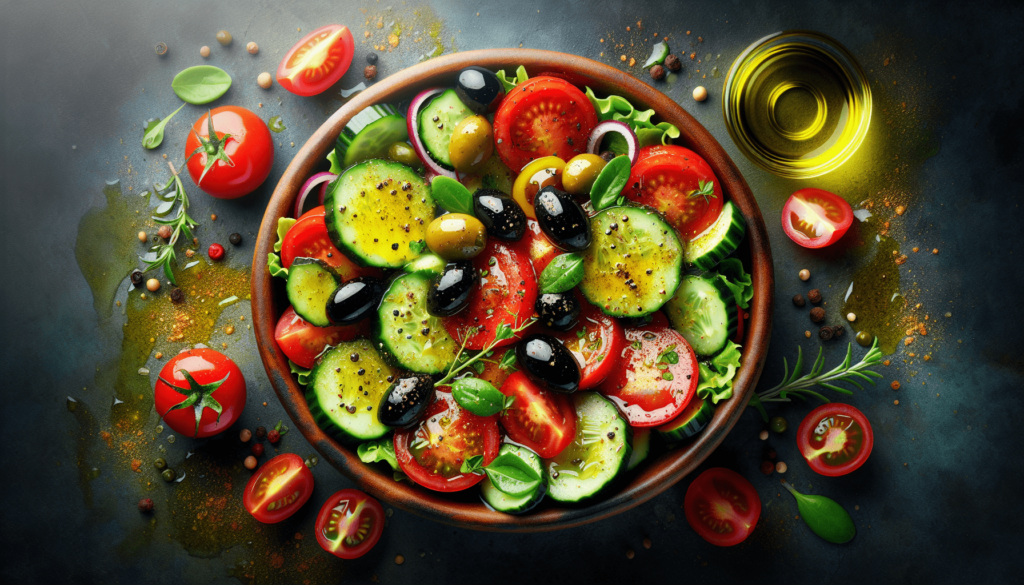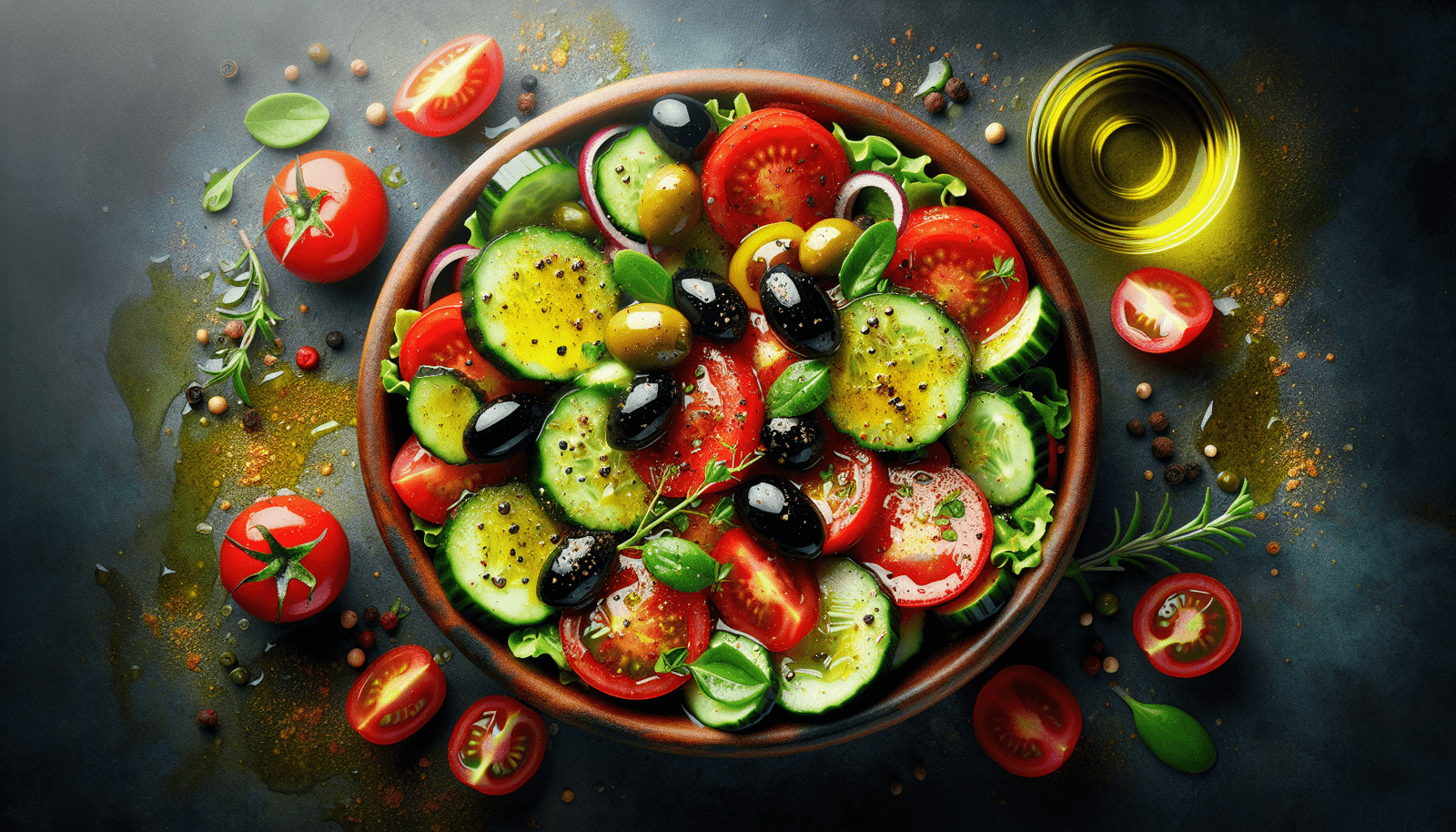Have you ever wondered why the Mediterranean diet is often celebrated as one of the healthiest ways to eat? It seems like every time you turn around, there’s a new study or expert praising its benefits. But why is that? Well, the Mediterranean diet is not just about losing weight or counting calories. It’s a way of life that focuses on eating fresh, seasonal, and flavorful foods that nourish both your body and soul.

What is the Mediterranean Diet?
The Mediterranean diet is inspired by the traditional diets of countries bordering the Mediterranean Sea, such as Greece, Italy, and Spain. It’s more than just a set of instructions; it’s a lifestyle choice emphasized by community, shared meals, and a deep appreciation for fresh ingredients. It’s a diet that’s rich in vegetables, fruits, nuts, grains, olive oil, fish, and a moderate amount of wine. By heavily limiting red meat, processed foods, and sugary treats, this diet promotes heart health, longevity, and even mental well-being.
Key Components of the Mediterranean Diet
To truly grasp the essence of this diet, let’s break down its key components that contribute to its health benefits and unique taste profile.
Emphasis on Vegetables and Fruits
You’ve probably heard the saying, “Eat the rainbow,” and this diet takes it seriously. By focusing on a wide variety of colorful fruits and vegetables, your meals become packed with essential vitamins, minerals, and antioxidants. Think of how beautiful a platter looks with vibrant tomatoes, lush greens, and bright oranges!
Whole Grains Over Refined Grains
The grains that are consumed are typically whole and unrefined. Instead of white bread and pasta, you’ll find brown rice, whole-grain bread, bulgur, and couscous. These grains not only provide fiber but also keep your blood sugar levels stable.
Healthy Fats from Olive Oil
One of the signature elements is the use of olive oil as the primary fat source. Rich in monounsaturated fats and antioxidants, olive oil is known to support heart health and reduce inflammation. Why not drizzle it over your salad and embrace its golden goodness?
Protein Sources: Fish and Legumes
Rather than relying heavily on red meat, this diet emphasizes protein from fish, legumes, and poultry. Fish such as salmon or sardines are rich in omega-3 fatty acids, which are crucial for brain and heart health. Meanwhile, legumes like lentils and chickpeas are fantastic plant-based protein sources.
Moderation with Dairy and Wine
The Mediterranean lifestyle doesn’t tightly restrict wine and dairy. Instead, it encourages moderation. A splash of yogurt or a sprinkle of cheese can enhance the flavor of dishes. A small glass of red wine, preferably with a meal, adds to the dining pleasure and is beneficial if consumed responsibly.
Benefits of the Mediterranean Diet
You’ve likely heard about its benefits, but what makes this diet so special compared to others? Let’s explore why it’s repeatedly voted the best diet for overall wellbeing.
Heart Health
Studies consistently show that the Mediterranean diet can reduce cardiovascular disease risk. Its reliance on healthy fats, whole grains, and an abundance of vegetables works together to maintain healthy cholesterol and blood pressure levels.
Longevity and Aging
Experts have found a link between the Mediterranean diet and increased longevity. By focusing on nutrient-dense foods, this diet reduces the risk of age-related diseases and supports a healthy and active lifestyle into older age.
Supports Brain Health
With its heart and brain-healthy nutrients like omega-3s, antioxidants, and anti-inflammatory compounds, the Mediterranean diet is associated with lower rates of cognitive decline and Alzheimer’s disease.
May Aid in Weight Management
Due to its focus on whole, unprocessed foods, you can enjoy a satisfying diet without over-consumption of calories, which may help with weight management. Filling your plate with vegetables and lean proteins keeps you satiated without unnecessary sugars or refined carbs.
Tips for Trying the Mediterranean Diet
While the basic components are easy to understand, transitioning to this diet may require some adjustments to your usual eating habits. Let’s look at some practical steps to help you get started.
Cook with Olive Oil
Opt for olive oil in your cooking instead of butter or other kinds of oils. From salad dressings to sautéing vegetables, olive oil is the heart-healthy choice you’ll love.
Fill Half Your Plate with Vegetables
Aim to fill at least half of your plate with vegetables at each meal. Try experimenting with Mediterranean staples like zucchini, eggplant, tomatoes, and peppers.
Select Whole Grains
Choose whole grains such as bulgur, barley, or quinoa. These grains retain their natural nutrients and fibers which are crucial for digestion and long-term health.
Incorporate More Fish
Plan for fish-based meals twice a week. Salmon, sardines, or mackerel are excellent options and are bursting with omega-3 fatty acids.
Snack on Nuts and Seeds
Instead of reaching for chips or sugary snacks, keep nuts and seeds within arm’s reach. Almonds, walnuts, and sunflower seeds are protein-rich options that will keep your hunger at bay.
Cook Together as a Family
At its heart, the Mediterranean diet is all about enjoying meals with family and friends. Make cooking and eating a communal activity, which can be a wonderful bonding experience.

Delicious Mediterranean Diet Recipes
Now, wouldn’t it be great to whip up some Mediterranean dishes at home? Here are some delightful recipes you can incorporate into your weekly meals.
Greek Salad
A refreshing and light dish that complements any meal! Here’s what you’ll need:
-
Ingredients:
- 1 cup cherry tomatoes, halved
- 1 cucumber, diced
- 1 red onion, thinly sliced
- 1 green pepper, sliced
- 1/2 cup Kalamata olives
- 1/4 cup feta cheese, crumbled
- 3 tablespoons olive oil
- 1 tablespoon red wine vinegar
- Salt and pepper to taste
- Fresh oregano leaves
-
Instructions:
Lemon Herb Grilled Salmon
Packed with flavor and ideal for a healthy dinner, this grilled salmon dish is a staple.
-
Ingredients:
- 2 salmon fillets
- 3 tablespoons olive oil
- Juice of 1 lemon
- 2 garlic cloves, minced
- Salt and pepper to taste
- 1 tablespoon fresh dill, chopped
- 1 tablespoon fresh parsley, chopped
-
Instructions:
Mediterranean Couscous Salad
This vibrant and satisfying salad is full of flavors that will transport you to the Mediterranean.
-
Ingredients:
- 1 cup couscous
- 1 1/2 cups vegetable broth
- 1/2 cup cherry tomatoes, halved
- 1/2 cup cucumber, diced
- 1/4 cup red onion, diced
- 1/4 cup feta cheese, crumbled
- 1/4 cup chickpeas, cooked
- 2 tablespoons olive oil
- Juice of 1 lemon
- Salt and pepper to taste
- Fresh mint leaves
-
Instructions:
- Bring vegetable broth to a boil, add couscous, cover, and let sit for 5 minutes. Fluff with a fork.
- Combine couscous, tomatoes, cucumber, red onion, feta, and chickpeas in a large bowl.
- In a small bowl, whisk olive oil, lemon juice, salt, and pepper.
- Pour the dressing over the salad, mix well, and garnish with mint leaves. Serve chilled or at room temperature.
Chickpea and Spinach Stew
This hearty, comforting dish is wholesome and easy to make.
-
Ingredients:
-
Instructions:
- Heat olive oil in a pot over medium heat. Add onion and garlic, sauté until translucent.
- Stir in cumin and paprika, cooking until aromatic.
- Add chickpeas, spinach, and diced tomatoes. Cook for 10-15 minutes until the spinach is wilted and the stew is slightly thickened.
- Season with salt and pepper, then serve with a crusty piece of whole-grain bread.
Embracing the Mediterranean Lifestyle
Adopting the Mediterranean lifestyle extends beyond just what’s on your plate. It emphasizes togetherness, savoring meals without rushing, and respecting the process of nourishing oneself. Here are some tips to incorporate this holistic lifestyle in your daily routine.
Eat Mindfully and Savor the Moment
Spend time understanding the flavors, textures, and aromas of your meals. Avoid distractions like screens during mealtimes and genuinely engage in the experience of eating.
Share Meals with Family and Friends
Gather around the dinner table with those close to you. Sharing meals is an important part of Mediterranean culture, fostering connections and creating memories.
Enjoy Pleasure, Moderation, and Variety
Mediterranean dining is about balance, not deprivation. Allow yourself to enjoy foods from all the categories mentioned above. Balance rich dishes with lighter fare and always remember the joy in variety.
Embrace an Active Lifestyle
Physical activity complements this diet naturally. Whether it’s a leisurely walk through the countryside or a morning yoga session, find an activity that you enjoy and make it part of your daily routine.
Find Joy in Cooking
Try to find pleasure in preparing meals. Use it as a time to experiment, learn, and spend quality moments with those around you. The beauty of the Mediterranean diet is deeply connected with cooking as an expression of love and creativity.
In conclusion, the Mediterranean diet is more than a meal plan; it’s a way to enrich your life. Embrace its principles, enjoy its recipes, and allow yourself to discover and experience the benefits of a healthier and more fulfilling life. You might just find this lifestyle not only improves your health but also brings more joy into everyday moments.
Some of the links on this site are affiliate links, which means I may earn a small commission if you click on them and make a purchase, at no additional cost to you. As an Amazon Associate, I earn from qualifying purchases.



